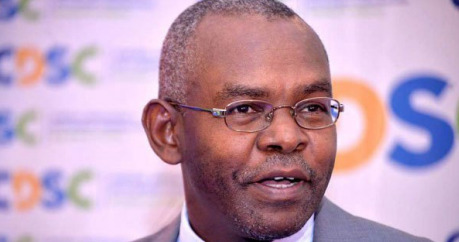Unveiling CBK governor nominee Kamau Thugge: Insights into his Background, Fiscal Policies, and Implications for Kenya

As Central Bank of Kenya governor Patrick Njoroge’s term comes to an end next month, the process to find his replacement has begun. On Monday, 15th May 2023, President William Ruto announced that he would nominate Dr. Kamau Thugge as his replacement.
His Background
Dr. Kamau Thugge is an economist and public servant who served as the Principal Secretary of the National Treasury. He received his Bachelor of Arts Degree in Economics from the University of Nairobi in 1982. He then went on to earn a Master of Arts degree in Economics from the University of Colorado at Boulder in 1984 and a Doctor of Philosophy degree in Economics from the University of California, Berkeley, in 1990. Between 1997 to 2002, he worked as an economist at the Ministry of Finance. In 2002, he was appointed as the Director of Economic Affairs at the Kenya Revenue Authority (KRA).
Dr. Thugge served in this position until 2007 when he was appointed as the National Treasury PS. In this position, he was responsible for overseeing the management of Kenya’s public finances. He has also played a key role in the development of Kenya’s economic policies. In 2013, he was appointed as the Chair of the National Economic and Social Council (NESC). In this role, he has been responsible for coordinating the development of Kenya’s economic and social policies.
He previously worked in the Ministry of Finance as head of the Fiscal and Monetary Affairs Department, as Economic Secretary and as Senior Economic Advisor. Before joining the Ministry of Finance, he worked with the International Monetary Fund (IMF) as Economist, Senior Economist and Deputy Division Chief.
Locally, some of Dr. Thugge’s high moments in his career include his role in influencing the design of Kenya’s current fiscal decentralisation system. He also coordinated the formulation of legislation for implementing devolution, the Commission on Revenue Allocation Act 2011, the Independent Officers (Appointment) Act, 2012, the County Government PFM Transition Act 2013, County Allocation of Revenue Bill 2013, and the Division of Revenue Bill 2013/2014.
Corruption allegations
While in public service, Dr. Thugge was embroiled in a corruption scandal. He, however, denied the allegations. In the allegations, he was accused of entering into a commercial loan facility agreement disguising it as a government-to-government loan guaranteed by the Italian government. Other officials who were implicated in the scam were former Kerio Valley Development Authority (KVDA) managing director David Kimosop and Treasury officials Kennedy Nyachiro (chief economist), Jackson Kinyanjui (Head of Europe Division) and Titus Muriithi (Director of Resource Mobilisation at Treasury).
They were all accused of jointly conspiring to defraud the government of $501,829,769, by entering into a deal to construct two dams, without approval. They allegedly committed the offence between December 17, 2014 and January 31, 2019.
In 2021, the DPP dropped the charges against him.
Fiscal policy
Notably in his workings at the IMF, Dr. Thugge was a staunch advocate of using donor aid to strengthen institutions and governance systems in poor countries to curb donor dependence. This view is articulated in an IMF policy paper he co-authored on debt relief for low-income countries and heavily indebted poor countries (HIPC). In it, he argued that given the pressures on aid budgets within significant donors, which according to him were likely to continue for the foreseeable future, he believed that continuing aid would be most effective if it catalyzed private financial inflows, particularly in investment.
He suggested that a focus on institution building was necessary to attract such private investment as well as support for putting in place the necessary infrastructure. He noted that many HIPCs face serious infrastructure and institutional problems. He also stressed that some HIPCs also need to address problems of governance, particularly as they influence investor confidence, such as the establishment of judicial systems, and effective application of the law.
His policy views of reducing the country’s dependence on donor funds and strengthening existing structures seem to align with the Kenya Kwanza government agenda as evidenced by the recent proposed changes in the Finance Bill 2023 and with the recent restructuring of key agencies such as Kemsa. However, whether his fiscal policy can be actualized if he assumes office can only be determined by time.
Conclusion
Dr. Thugge’s appointment may risk criticism from independence hawks who insist that the CBK governorship should be the office that objectively dispenses its obligations with little interference from external interests. This will be a challenge as the Ruto administration has been criticized for appointing yes-men. His appointment comes at a time the country is grappling with a myriad of financial issues, including high inflation, and the weakening of the Shilling amid a credit crunch.

